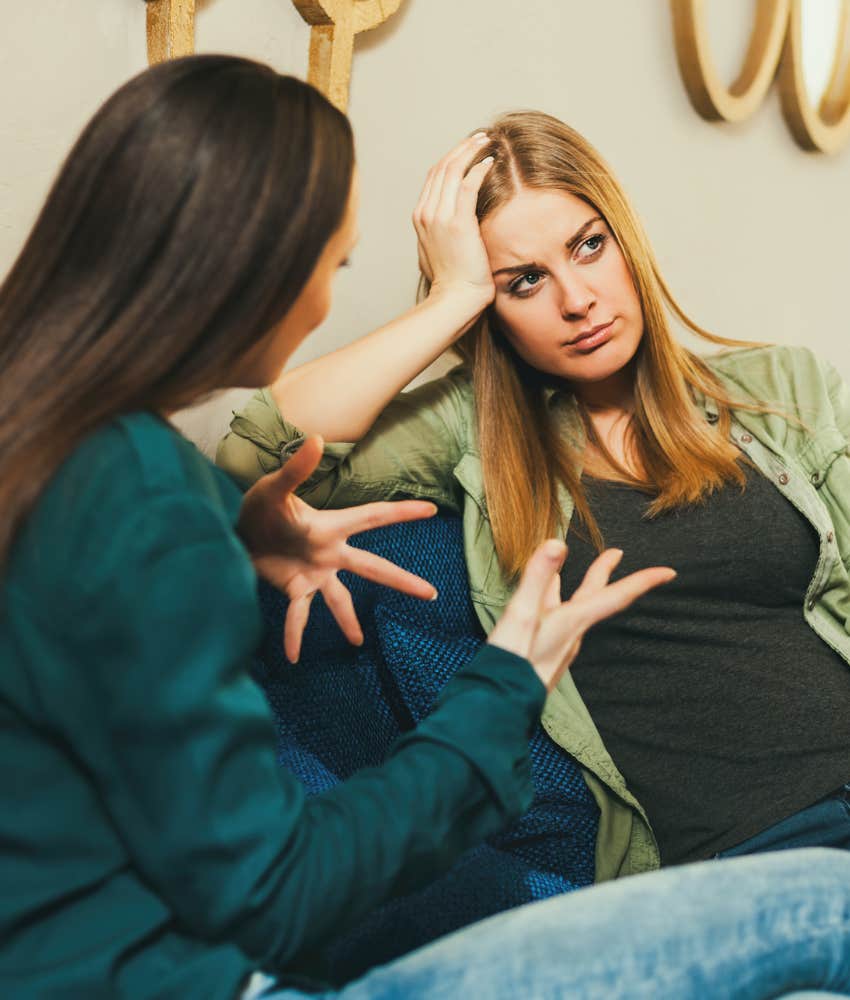19 Signs Your Friendship Has Been Off For Awhile, Even Though Nothing Major Happened
 Bricolage | Shutterstock
Bricolage | Shutterstock Knowing when a friendship has been off for a while is just as important as knowing when it's time to leave a love affair. We spend a great deal of time thinking about, reading about, and talking about our primary love relationships — a romantic partner, spouse, or lover — and understanding whether those relationships are salvageable or worth keeping when the going gets rough. But what about our friendships? Just as in romantic relationships, a friendship may need to end even though nothing big or crazy happened. Ending a friendship can be as difficult and heartbreaking as ending a long-term relationship.
Here are signs your friendship has been off for a while now, even though nothing major happened:
1. Someone's pulling back
You or the other person starts to pull back. Research explains that when it comes to our needs and emotional intimacy, we tend to go more to our friends rather than our main love objects. Supposedly, they are more neutral and less threatening. There's truth in that. You don't live with your friends daily, nor do you live with them 100 percent of the time to experience their foibles. Thus, having good and solid friendships is critical support in our lives and other relationships.
2. There's hesitancy to open up
 Mladen Mitrinovic via Shutterstock
Mladen Mitrinovic via Shutterstock
You feel hesitant to talk about problems that were once easy to talk about.
3. Discussions are a dead-end
When you discuss problems, you seem to get nowhere.
4. There are power struggles
The relationship is fraught with power struggles.
5. They're demeaning
You somehow feel demeaned at the end of an encounter.
6. You hide your true self
You begin to hide true thoughts and feelings when around your friend. Personal development coach Kate Siner cautioned, "Most of the time we walk around in the superficial part of ourselves — the mask. In fact, many people don’t even know that is where they are living. You can challenge your mask by asking if what you are thinking or feeling is actually true or if it might be able to be viewed from a different perspective."
7. You feel like you can't say no
You stop feeling safe to say "no" in the friendship.
8. You become incompatible
You see that you and your friend stop being compatible.
9. They're two-faced
 Prostock-studio via Shutterstock
Prostock-studio via Shutterstock
The person talks about you behind your back. Life coach Kelly Rudolph explained, "People don't do things to us. They do things for themselves to get their needs met. If someone helps you, they do so because it makes them feel good to help. If they attack you, it makes them feel big and strong for the moment. If we take everything personally, we won't have any self-confidence at all, which results in low self-esteem, which creates a lack of healthy boundaries to protect us mentally, emotionally, and physically."
10. Trust is broken
The person shares information they promised to keep confidential. Or, your friend makes and then breaks promises. Eventually, you stop trusting the person.
11. They're defensive
When you bring up problems, the person becomes defensive or withdraws.
12. They're critical
You are blamed or criticized for problems or disagreements. Relationship coach Jennifer Twardowski suggested, "Make it known that you don't really accept someone talking to you in this way. You may need or want to pair this with an action like distancing yourself from the person or not acknowledging them when they do talk. Learning to do this with very difficult people who don't have any sense of boundaries can feel very draining. You may also feel like they just don't get it and will never get it. Know that it isn't your responsibility to teach them; they must learn this for themselves."
13. They bombard you with unsolicited advice
The person gives you advice when not asked for.
14. They're not there for you
The friend is not there when you need them most.
15. Their friendship feels conditional
You're being cared for begins to feel conditional on your pleasing them.
16. They sap your energy
The relationship begins to zap you of your life energy. Life counselor Larry Michel advised, "It's okay to not want to spend time with them. When you're together, you can do so fully embracing that both of you are unique, different, and committed to quality time with each other. If you choose not to, you can spend less time with them without guilt, shame, or blame. Most importantly, you can entirely drop the belief that they are intentionally trying to suck the life out of you because, after all, there is no such thing as real vampires."
17. The friendship is one-sided
You are putting more time into the relationship than they are.
18. Compassion and understanding are lacking
 Miljan Zivkovic via Shutterstock
Miljan Zivkovic via Shutterstock
The relationship lacks a compassionate understanding.
19. Your intuition flares
Your intuition says it's time to end it.
If you assess your relationship and find a few of these signs that indicate it's time to end a friendship, the first thing to do is talk about how you're feeling about the behaviors present.
Use the sandwich approach for each: positive, negative, positive. "I really value our friendship, but when you don’t return my calls or texts, I feel disrespected and unimportant. I would like our friendship to continue, and what I need from you is to return my calls and texts."
If you feel heard and the friend takes responsibility for the behaviors, indicating they want to change, then you can see how it goes.
If there are more than three of the above behaviors and you have let things build up, you need to take responsibility for not speaking up sooner. Unfortunately, when we collect bad feelings, we are less apt to be rational when we present our case.
Be sure you're in a place where you can discuss without spewing out your bad feelings in a way that you are not likely to be heard or regret later. The process of how we say things is more important than what we say, as it can make or break the conversation.
If there are seven or more of the above signs, it's time to consider ending the relationship. It is quality, not the quantity of relationships, that's important. If you have a handful of true friends you know you can count on no matter what, you are lucky. Rid yourself of those who are toxic or unreliable.
Before evaluating when to end a friendship, do you know what makes a friend a true friend?
A solid friendship is "green and growing." In a healthy friendship, it's safe to be who you are, to have needs, to share feelings, to disagree, and give honest-to-goodness feedback to them about how their behavior affects you.
A friend listens without judgment, takes responsibility for their half of the relationship, gives advice only when asked for, lends strength in difficult situations, and, most importantly, all of what you share with a friend is kept confidential.
A true friend accepts you unconditionally, and you know you can count on them at difficult times. Their words and actions match, they treat you with respect, and they act in integrity.
Brenda Schaeffer is a licensed psychologist, trauma expert, international speaker, communications consultant, and spiritual teacher.

